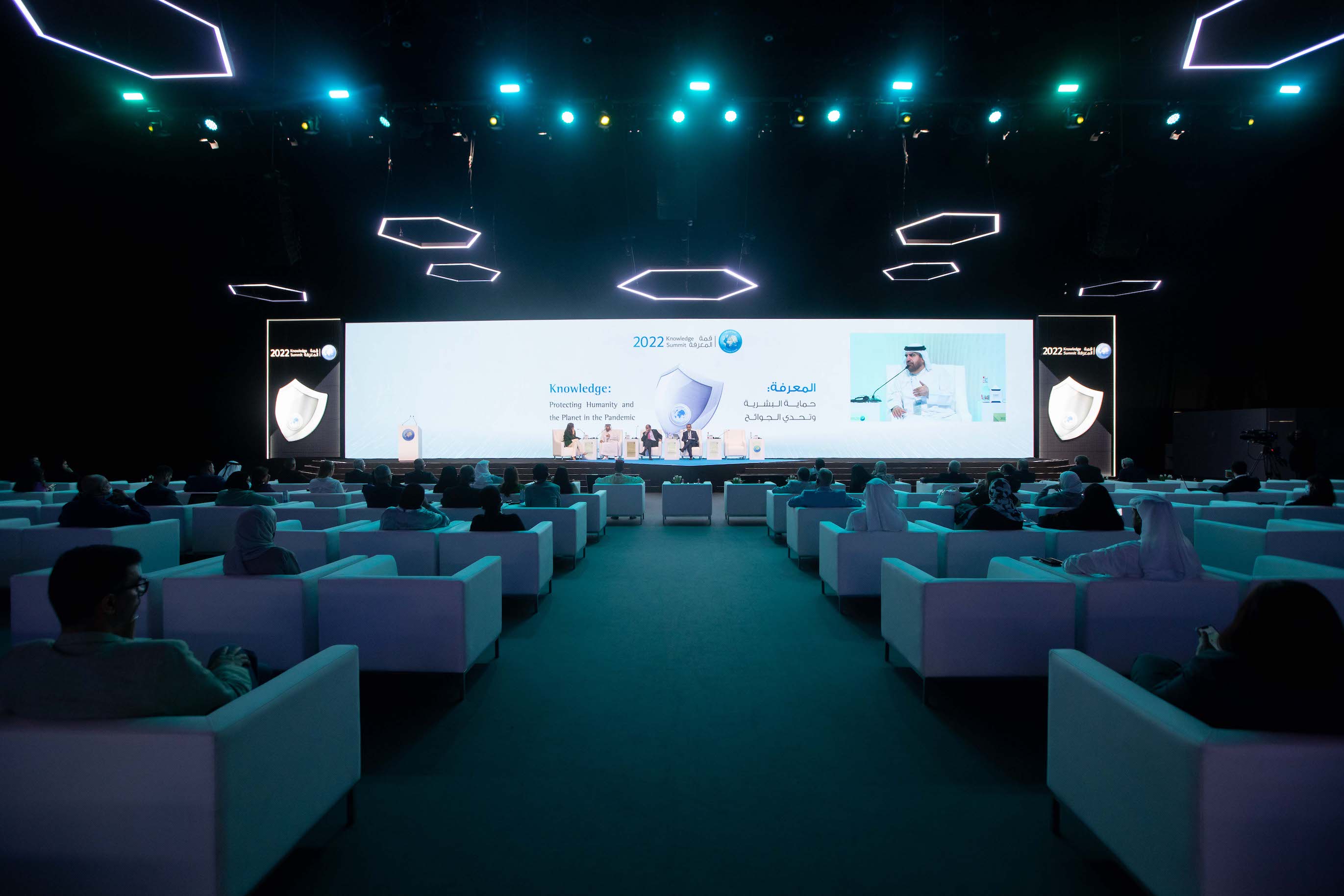Knowledge Summit discusses contribution of knowledge to Sustainable Development
17 Mar 2022
DUBAI, United Arab Emirates, 17 March 2022 – The role of Mohammed bin Rashid Al Maktoum Knowledge Foundation (MBRF) in the global dissemination of knowledge, the importance of its partnership with the UNDP, and the main outcomes of the Global Knowledge Index 2021 are some of the topics which were extensively discussed during a panel discussion held on the sidelines of the seventh edition of the Knowledge Summit.
The panel discussion titled “UNDP and MBRF: A Partnership for Sustainable Development”, saw the participation of H.E. Jamal Bin Huwaireb, CEO of MBRF; Khaled Abdel Shafi, Director, Regional Hub for Arab States, UNDP; and Dr. Hany Torky, Chief Technical Advisor and Project Manager, Knowledge Project, UNDP. The event was moderated by TV anchor Noufer Ramoul.
Bin Huwaireb highlighted the importance of MBRF’s strategic partnership with the UNDP within the Knowledge Project, which intends to empower and promote knowledge in societies in order to achieve the UN Sustainable Development Goals. “Numerous significant, including the Global Knowledge Index and the Future of Knowledge Foresight Report, have resulted from this partnership,” His Excellency added.
Terming COVID-19 pandemic as the most difficult time in contemporary human history, Bin Huwaireb said it has severely restricted people's activities, weakened tourism, and shut down production chains affecting all sectors, particularly health and economy.
His Excellency said that the third edition of the Future of Knowledge Foresight report, a pioneering study that examines the future knowledge landscape and various countries' capacities in the face of global risks based on a comprehensive collection of data, has been launched.
Bin Huwaireb said: “This report is an outcome of a long-standing partnership between MBRF and UNDP under the Knowledge Project initiative, aimed at empowering and promoting knowledge in societies in order to achieve UN Sustainable Development Goals. The Knowledge Project has released the Global Knowledge Index, which assesses the knowledge situation, and the Future of Knowledge Foresight Report, which summarises a quantitative and comprehensive analysis of the knowledge spectrum. The report was prepared using more than 150 million sources of digital information.”
Asserting that UAE is topping more than 400 different global indicators, he said the Emirates is leading the way in excellence and leadership and possessing access to the top positions worldwide in many fields among developed countries.
During the discussion, Khaled Abdel Shafi highlighted the adverse impact of COVID-19 pandemic on the economy and health, saying that the pandemic has exposed many gaps in economic and social systems, such as the digital divide affecting 50 per cent of Arab countries in health, education, and government services.
Abdel Shafi stressed the importance of the Future of Knowledge Foresight Report, which has been derived from lessons learned from past events, and look towards preparing for the future, instead of looking for solutions when things go wrong. He noted that empowerment, building vulnerability, capacity, and resilience to respond to crises and absorb shocks are essential pillars of development work. “There is a disparity among states in dealing with the COVID-19 pandemic. The Gulf states in general and the United Arab Emirates, in particular, have shown great efficiency in taking preventive action against the spread of the virus and raising community awareness of the instructions and decisions of the stakeholders. This has significantly helped in reducing the spread of the pandemic,” he added.
He asserted that UNDP is proud to partner with the MBRF and sought measures to strengthen the partnership between the two for a long time.
During the discussion, Dr. Torky noted that COVID-19 pandemic has benefited information flow, enhancing the knowledge index that involved building a team of more than 50 international experts across various fields. “The Future of Knowledge Foresight Reports for 2018 and 2019 had seen many questions about the capacity of countries and their readiness to move forward on future knowledge paths,” he said.
However, he said the new edition of the report raises questions more specifically about the structural character of the capacity of countries to cope with external risks.
Dr Torky stressed that the report aims to support national leadership in ensuring future preparedness for global risks. The third edition of the Future of Knowledge Foresight Report builds on the previous two reports, with the objective of exploring methodologies and best practices for countries to enhance their collaborative and innovative transformative capacities in a global context filled with risks, disruptions, and challenges, particularly technological, health, and environmental risks.
The Mohammed Bin Rashid Al Maktoum Knowledge Foundation organized the 7th edition of the Knowledge Summit in collaboration with the United Nations Development Program (UNDP), under the theme “Knowledge: Protecting Humanity and the Planet in the Pandemic,” at Expo 2020 Dubai on March 14 and 15, followed by virtual sessions from March 16 to 18, with the participation of a wide range of experts, leaders, and government officials from around the world.
